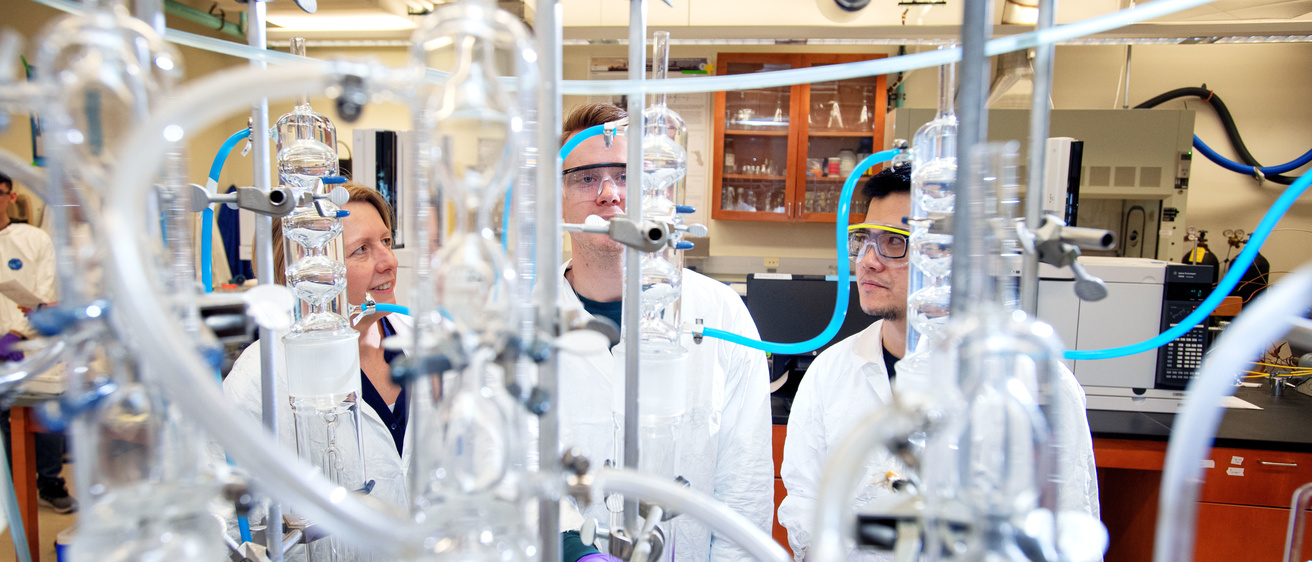Environmental engineers apply engineering principles to design systems that control pollution and protect public health. They restore air, soil, and water quality at previously contaminated sites and develop systems that convert waste into clean energy. Environmental engineering addresses the complex food, energy, and water issues of the 21st century.
A degree in environmental engineering allows you to work in any aspect of environmental protection, including air pollution control, industrial hygiene, radiation protection, hazardous waste management, toxic materials control, water supply, wastewater management, stormwater management, solid waste disposal, public health, and land management.
The Department of Civil and Environmental Engineering is committed to providing high-quality education and research experiences for students. Resources and efforts are focused on areas of unique strength, including water resources engineering, environmental solutions, and sustainability.
Students choose to study engineering at Iowa because of the college's academic excellence, individual attention, small-college environment, camaraderie, and tremendous opportunities. U.S. News & World Report ranks Iowa's undergraduate program in the top third of engineering programs nationwide.
The BSE in environmental engineering is one of eight undergraduate programs in the College of Engineering, which offers excellent opportunities for students to participate in research, internships, study abroad, and student organizations.
Iowa admits incoming first-year students directly into engineering. Approximately 500 new students join the College of Engineering each year. Women account for over 28 percent of Iowa’s engineering students; the national average is 25 percent.
Engineering student support services include free tutoring for your first two years of math, science, and engineering courses.
BSE/MS Fast-Track Degree Program
This program is for eligible students who seek to earn both the BSE and MS degrees in environmental engineering at Iowa. BSE/MS students may attend the departmental graduate seminar and work on a master's thesis or research project while they are still undergraduates. They may count a limited amount of course work toward both degrees. Once students complete the bachelor's degree requirements, they are granted the BSE and they normally complete the MS degree one year later.
Information

First-Year

Transfer

International
Within six months of graduating, 96 percent of Iowa graduates are employed, continuing education, or not seeking work. Our Pomerantz Career Center offers multiple resources to help students find internships and jobs.
Engineering Career Services develops and promotes experiential education and professional opportunities for students. Professional staff coordinate the college's co-op and internship program, engage in employer outreach, and host an engineering career fair each semester.
Engineering is a well-respected profession that is used as a foundation for a variety of careers in industry, medicine, law, government, and consulting.
Engineering majors hold eight of the top ten spots on the list of top-paid majors for bachelor's degree graduates, according to the National Association of Colleges and Employers (NACE).
In addition to more than 600 student organizations, Iowa students choose from more than 100 study abroad programs and multiple undergraduate research opportunities.
Engineering fraternities and sororities, student organizations, and national honorary societies offer many opportunities to network and develop your leadership skills and abilities.
The University of Iowa provides a variety of scholarships to eligible undergraduate students through the Iowa Scholarship Portal. Scholarships are available to first-year, transfer, and currently enrolled students. For additional details on scholarships for your program of study, check directly with the department or college.
Apply early for scholarships. The College of Engineering offers Engineering First-Year Scholarships as well as many other scholarships opportunities for sophomore, junior, and senior students. To learn more, visit College of Engineering Scholarships.
The Office of Admissions and the Office of Student Financial Aid are great resources for students seeking scholarships.
Iowa's environmental engineering program provides graduates with scientific and technical knowledge and equips them with problem-solving, teamwork, and communication skills that will serve them throughout their careers. The program emphasizes both a broad education in environmental engineering fundamentals and the opportunity for in-depth learning.
Students are exposed to current environmental issues in the First-Year Seminar. Many courses feature active and hands-on learning opportunities, including laboratory exercises that involve data collection on smartphones.
In addition to the BSE core requirements and the curriculum designed for the environmental engineering major, students must complete general education courses and an elective focus area.
The elective focus area enables students to gain depth of knowledge in a specific career path. Students may choose a suggested environmental focus area or work with their advisor to develop an individualized focus area based on their interests and career goals.
See Environmental Engineering in the UI General Catalog to learn about required course work and graduating with honors in this major.
